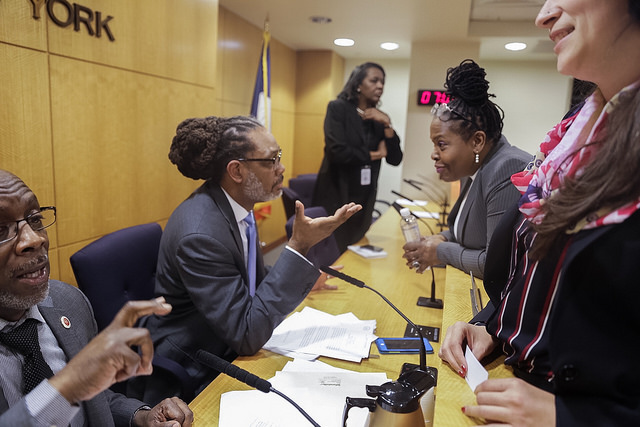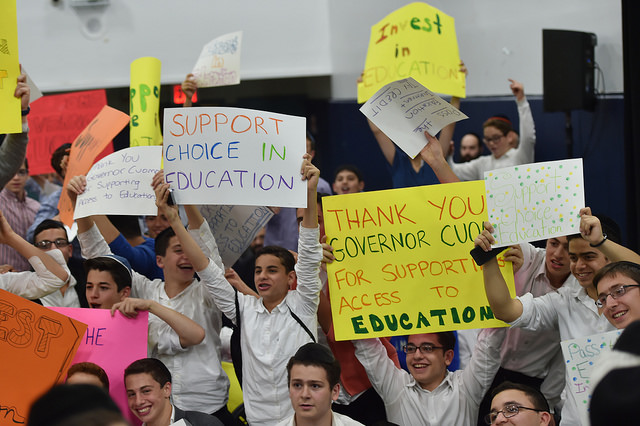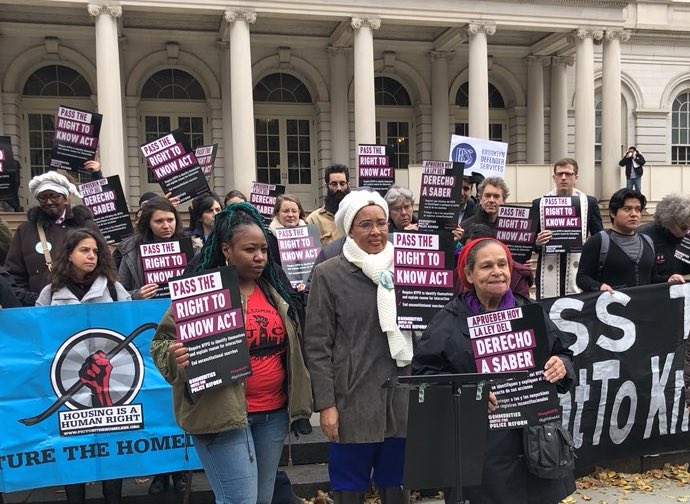The Airbnb Reality in Central Brooklyn

City Council Member Robert Cornegy (photo: William Alatriste)
Just when I thought I’d seen it all, here comes Michael McKee with a screed against middle class home sharers like me that would -- or at least should -- make the hotel industry blush. From one New Yorker to another - thanks but no thanks. We don’t need a white “savior” to tell people of color that they know how to best address gentrification in their communities.
I am a third generation Bedford-Stuyvesant resident, mother of three, and a proud constituent of City Council Member Robert Cornegy, Jr. For years, I’ve shared my home with travelers from all over the world -- introducing people to my favorite local businesses and generating some extra income to provide for my family.
Hosting through Airbnb helps me pay my property taxes, contribute to my children’s education, and stay in the home and neighborhood I love, so that one day I can pass it on to my children.
In his op-ed, McKee uses desperate attacks filled with debunked reports and misleading data to explain his misinformed view of why home sharing “doesn’t work.” He asserts that "75 percent of Airbnb revenue in New York City is generated by commercial hosts with multiple listings, not ‘regular folks’ renting their own place.” This is false.
In reality, 95 percent of New York City hosts who share an entire space have a single listing and 88 percent of host earnings in the city come from guest stays in private and shared spaces (i.e. a spare bedroom), long-term stays lasting at least 30 days, and short-term stays with hosts who have only one entire home listing.
This data can easily be found in Airbnb’s monthly data releases, but it’s pretty clear that McKee has no use for facts.
Indeed, he claims, without evidence, that "North and Central Brooklyn are the epicenter of gentrification in New York City, and Airbnb has played a destructive role.” Nothing could be further from the truth. In fact, Airbnb is helping families like mine stay in our communities. Home sharing is a bulwark against gentrification and the rising cost of living. Seventy-nine percent of Airbnb hosts in New York City report that home sharing has helped them stay in their homes, with 30 percent saying it’s helped them avoid eviction or foreclosure.
Moreover, rents in many Brooklyn neighborhoods were rising far before Airbnb came to town. According to MNS monthly reports, the average 1-bedroom in Williamsburg in January 2011 -- when Airbnb was still in its infancy -- cost $2,979 a month. In October 2017, the figure was $2,946, a decrease over the period of Airbnb's greatest growth.
The sad truth for a proud organization like Tenants PAC is that its leader, Mr. McKee, sounds more like a mouthpiece for the big hotel industry than he does an ally of tenants and homeowners.
It’s outrageous for McKee, who lives in a pre-war condo in Chelsea, where two-bedroom units sell for over $1 million and one-bedrooms rent for more than $4,000, to point his finger at New Yorkers like me as the cause of gentrification in our own neighborhoods. It's even more ridiculous when he cites an offensive, completely flawed "study" by an opponent of home sharing that was torn apart by actual academics.
Instead of parroting specious arguments made by the hotel industry, which continues to bulldoze permanent housing to build luxury hotels in New York City, even as profits stand at all-time highs, true advocates for tenants should get behind a bill introduced by Brooklyn Assemblymember Joe Lentol, A-7520, which would ensure that New Yorkers could share their own home, while protecting affordable housing from bad actors who threaten to remove permanent tenants.
The bill creates a mandatory registration system for hosts and would allow Airbnb to collect nearly $100 million in lodging/sales taxes in the first year alone. That’s money that could be used for affordable housing, as in Portland, Oregon and New Orleans, or services for people without homes, as in Chicago and Los Angeles.
You don’t have to look at Census data to realize that there are more white folks and fewer black folks here than there were 10 years ago. Bed-Stuy isn’t static -- no neighborhood ever is. But families like mine that have invested blood, sweat, and tears into this community for generations are going to do whatever we can -- including hosting through Airbnb -- to keep a toehold in the place we call home. Maybe Michael McKee should swing by sometime and see what we’re all about.
***
Richelle Burnett is Airbnb host who lives in Bedford-Stuyvesant.
***
Have an op-ed idea or submission for Gotham Gazette? Email This email address is being protected from spambots. You need JavaScript enabled to view it.
Stop the Yeshiva Madness

(photo: Office of the Governor - Kevin P. Coughlin)
In recent weeks, the distortions and misinformation about the education our yeshivas provide to our students has grown exponentially. The absurdity hit a new high two weeks ago, when David Bloomfield argued in a Gotham Gazette op-ed that Mayor de Blasio and other elected officials could face arrest over the issue.
Two years ago, a former yeshiva student sent a short letter to the city’s Department of Education alleging that some 30 yeshivas did not offer any secular studies or any instruction in English. This, he said, ran afoul of a state requirement that private schools provide “substantially equivalency of instruction” to its students.
Yeshivas are religious schools whose goals and philosophy differ from public schools – and from one another. Bloomfield has spent much of his career at public institutions, so it is not surprising that he has some fundamental misunderstanding of yeshivas. There are more than 275 yeshivas in this city and they are as different from one another as they are similar.
Our yeshivas educate more than 110,000 students annually, and so it is also not surprising that some graduates are disaffected critics. But if Bloomfield is to be taken seriously, he can’t analyze by anecdote or use his lack of knowledge about our schools to spread innuendo.
Bloomfield probably teaches several dozen students a year, yet I’m sure he wouldn’t think it fair to be judged by those who thought his class was a waste of time. Yet Bloomfield has no problem judging a system of 275 independent schools with more than 100,000 students by a handful of dissatisfied alumni.
These critics released a deeply flawed, though widely-quoted, report asserting that our students aren’t learning, and that our graduates aren’t prepared for the workforce. Few if any of those who have cited the report have looked at it closely. If they did, they would realize that its methodology is more Survey Monkey than scholarship – it was based on a survey completed by 50 supposed yeshiva graduates who are Facebook friends with the author of the complaint letter to the City.
The report’s distortions were insulting to the thousands of families who send their children to yeshivas each day. We are enormously proud of the education our yeshivas provide. Our students attend school for 12 hours every day – a strikingly longer school day than required by most other districts. Yes, much of the day is devoted to study of Jewish law, consistent with a tradition stretching back a century. But our classrooms are filled with intellectual debate and academic rigor more common to colleges than middle schools. Our students are taught to analyze facts, debate ideas, challenge assumptions, and think critically. Our attendance and graduation rates exceed those of the public schools. Our graduates are integral to the fabric of our city’s economic life.
While Bloomfield is quick to reach snap conclusions about the mayor and yeshivas, he has much less to say about the performance of public school students. Let’s start with English Language Learners – those students for whom English is not the first language, similar to many Chasidic school students – in Brooklyn public schools. Bloomfield focuses on the performance of ELLs in Chasidic yeshivas but has nothing to say about the proficiency of ELLs in proximate public schools. That's a shame, because the performance results of ELLs on state-mandated tests for Districts 14 and 20 - where the vast majority of the yeshivas subject to the original complaint are located – are depressing. For most subjects and grade, the proficiency rate is in the single digits. Substantial equivalence indeed!
Yeshivas can surely improve, but ultimately parents must have the right to choose how their children are educated. Every year, thousands of parents choose to send their children to yeshivas both for their unique curriculum and to avoid the failures of a public school system about which they have no desire to be “substantially equivalent.”
It is far easier to criticize than to understand. If critics want to be taken seriously by the institutions they hope to impact, they need to demonstrate a deeper understanding of the values that have helped yeshivas thrive, and they must refrain from defining a multi-faceted system of 275 schools and 100,000 students by what they perceive to be the weakest few schools and students.
***
Avi Greenstein is the Executive Director of the Boro Park Jewish Community Council, a member of the executive committee of PEARLS, and a former principal at Yeshiva Imrei Yosef.
***
Have an op-ed idea or submission for Gotham Gazette? Email This email address is being protected from spambots. You need JavaScript enabled to view it.
Right to Know Act: Progress and Disappointment

On Tuesday, the New York City Council passed two police reform bills. One marks a vital step toward police reform and accountability. The other takes our city in the wrong direction.
First the good news: a consent to search bill, sponsored by Council Member Antonio Reynoso, passed with support from over 200 community organizations, including the families of New Yorkers killed by police, and organizations led by homeless, LGBTQ, undocumented, and formerly incarcerated New Yorkers, and black and Latino youth. The bill will require the NYPD to create a policy directive that mandates that police officers notify New Yorkers of their right to refuse a search if the officer does not have probable cause to search them.
The NYPD will also have to document proof of consent, and ensure translation if necessary, so all New Yorkers comprehend it is their constitutional right to refuse searches without probable cause. It is a common sense and long overdue reform that will enhance accountability measures and increase protections for New Yorkers during interactions with officers.
The second bill, sponsored by Council Member Ritchie Torres, was opposed by over 200 community organizations, all five public defender offices, 100 Blacks in Law Enforcement Who Care, the National Latino Officers Association, and the Grand Council of Guardians. This legislation, known as the police identification bill, will in some situations require police officers to provide New Yorkers with a business card identifying the officer and an explanation for the stop.
As with consent to search, community members had pushed for such legislation for years. But inexplicably, because of last-minute changes, the final bill intentionally excludes traffic stops as well as the majority of non-arrest street encounters with police officers. It also includes a broad exception that significantly limits the NYPD’s responsibility to provide New Yorkers with an explanation for why they are being stopped.
Here’s what the holes in the final police identification bill mean in practice. If a young person is coming home from school and an officer asks him, “what are you doing?” or “where are you going?” or has his hand on his gun when he commands, “show me your ID,” that officer will not be required to provide a card identifying him- or her-self after the encounter.
If multiple officers corner a young person in front of her building and begin asking similar questions, they will not be required to provide identification after the interaction. If an officer stops a transgender woman and wants to know “why are you on this block,” or “what are you doing tonight,” this law will not ensure they know who is stopping them and why they are being stopped.
These everyday encounters for many young black, Latino, and transgender New Yorkers, which are just as likely as any other police interaction to lead to misconduct, harassment, or even abuse by officers, have been carved out of the bill without sufficient explanation.
President Obama’s 21st Century Task Force On Policing recommended law enforcement agencies require officers to identify themselves by their full name, rank, and command in writing to individuals they have stopped and provide an explanation for the stop. This past summer, the city of Albany, New York passed a bill requiring just that from their police officers.
New York City is not setting a baseline for future police reform. The baseline has already been set. By passing a bill that creates exceptions for thousands of stops and interactions with police officers, New York is merely confirming the NYPD sets police legislation and setting a weak precedent for other localities.
The Right to Know Act originated from the experiences of New Yorkers most impacted by police misconduct and abuse, including the families of those killed by police officers, and black and Latino youth from Bushwick, Bedford-Stuyvesant, and East New York who have led our organizing efforts. No one—not Council Member Torres, Speaker Melissa Mark-Viverito, Mayor Bill de Blasio, or NYPD Commissioner James O’Neill—has offered these young people any explanation for excluding common stops and interactions they are forced to navigate on a daily basis. If New York City is committed to “neighborhood policing,” someone should explain why those neighborhood cops shouldn’t simply hand over a business card and offer an explanation after stopping a New Yorker.
It has been over three years since the world watched an NYPD officer choke the last breath out of Eric Garner’s body on a Staten Island sidewalk. Now, this City Council has passed the only bills since that fateful day that address transparency, accountability, and protections for New Yorkers during interactions with the NYPD. It’s good news for all city residents that the Council passed a strong consent to search bill. But it’s deeply unfortunate that the Council allowed the NYPD to squeeze through a gutted version of police identification legislation that comes up short of the necessary reform that so many New Yorkers have spent the last five years demanding.
***
Kesi Foster is a lead organizer with Make the Road New York, which a member of the Steering Committee of Communities United for Police Reform. On Twitter: @MaketheRoadNY.
***
Have an op-ed idea or submission for Gotham Gazette? Email This email address is being protected from spambots. You need JavaScript enabled to view it.




